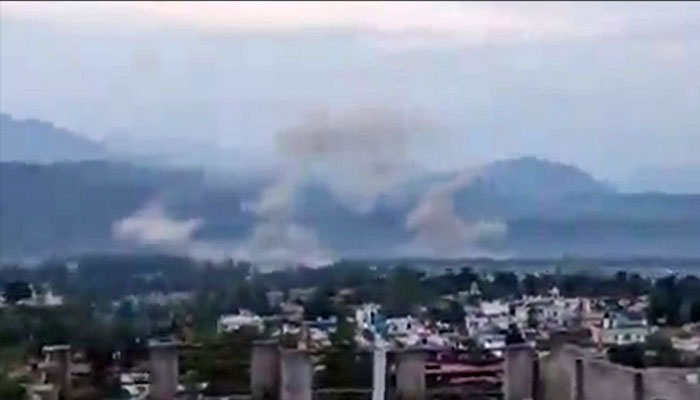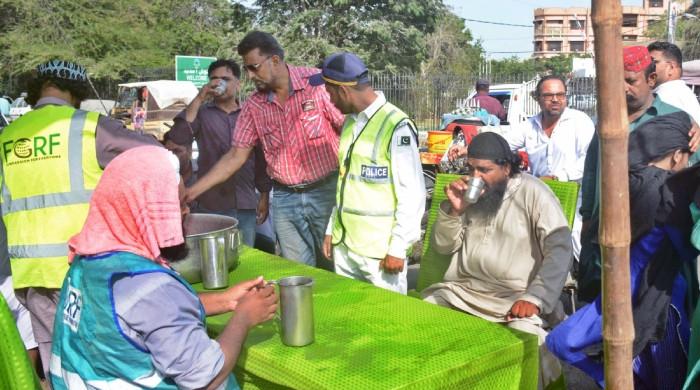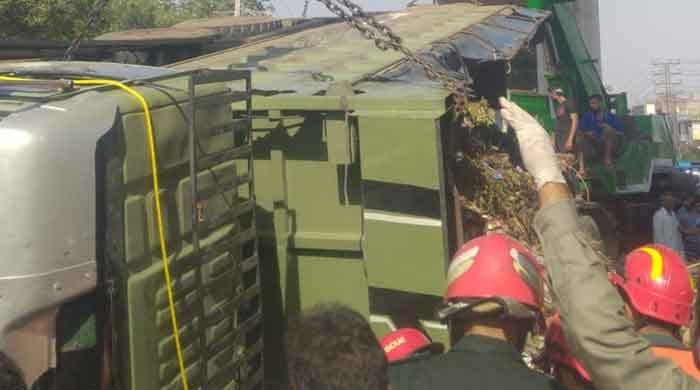 Udhampur Air Base in India hit by missile launched by Pakistan, May 10, 2025. — Screengrab via video/ISPR
Udhampur Air Base in India hit by missile launched by Pakistan, May 10, 2025. — Screengrab via video/ISPR - Indian Army brigade headquarters, supply depot at Uri also destroyed.
- Indigenously developed Fateh-1 missiles strike Udhampur air base.
- Cyberattack cripples 70% of India’s power grid.
Shortly after India launched unprovoked missile attacks on Pakistani airbases amid heightened tensions in the aftermath of the attack on tourists in Indian Illegally Occupied Jammu and Kashmir (IIOJK), the Pakistan army launched "Operation Bunyan ul Marsoos" and hit several Indian military sites, security sources said.
The latest escalation in the decades-old Pakistan-India rivalry began on May 7 when at least 31 civilians were killed in an unprovoked Indian cross-border attack. In retaliation, Pakistan downed five IAF fighter jets, including three Rafale, and dozens of drones.
Meanwhile, India continued to send drones into Pakistani territory, with the military shooting down nearly 80, including Israeli-made IAI Heron — medium-altitude, long-endurance — unmanned aerial vehicles (UAVs).
Pakistan strikes back
Shortly after the attack on the Pakistani airbases earlier today, the Pakistan army launched its counter-attack in direct response to continuous provocations by India.
Security sources told Geo News that at least 11 sites in India were targeted, including the key Pathankot air base, Udhampur air base, Gujarat air base, Rajasthan air base and Brahmos storage site.
Furthermore, sources said that Pakistan targeted the Udhampur air base with a barrage of three missiles, which were the indigenously developed Fateh-1, with a range of 120kms
Meanwhile, the Pakistan armed forces also destroyed an Indian Army brigade headquarters and the supply depot at Uri. On the other hand, a cyberattack reportedly disabled 70% of India's power grid, security sources added.
In another wave of strikes, the armed forces targeted and destroyed a second Brahmos storage site in Nagrota. An Indian Army artillery battery was also destroyed.
On Friday night, India launched multiple missile attacks on Pakistani airbases, including the Nur Khan, Murid, and Shorkot airbases, which were fired from aircraft, according to Director General Inter-Services Public Relations Lieutenant General Ahmed Sharif Chaudhry.
He further said that India had also targeted Afghanistan with missiles and carried out a drone strike in the region. “India is aggressively pushing the entire region towards war with its reckless actions,” he said during a media briefing.
DG ISPR assured that all assets of the Pakistan Air Force (PAF) are secure. "All our assets are safe, and we are fully prepared for any response," the DG ISPR added.
'Exercise restraint'
The Group of Seven (G7) countries urged maximum restraint from both India and Pakistan and called on them to engage in direct dialogue amid rising hostilities.
In a statement released by Canada, the foreign ministers of Canada, France, Germany, Italy, Japan, US, UK and the European Union said they "strongly condemn" a deadly attack on tourists in Indian Kashmir on April 22 and "urge maximum restraint from both India and Pakistan."
"We call for immediate de-escalation and encourage both countries to engage in direct dialogue towards a peaceful outcome," the G7 statement said.
Locked in a longstanding dispute over Kashmir, the two nuclear-armed neighbors have engaged in daily clashes since Wednesday when India launched strikes inside Pakistan.
India said the strikes were retaliation for the April 22 tourist attack that it blamed on Pakistan and for which Pakistan denies responsibility. Pakistan vowed to retaliate. Pakistan and India claim Kashmir in full but each controls only part.
.png)




